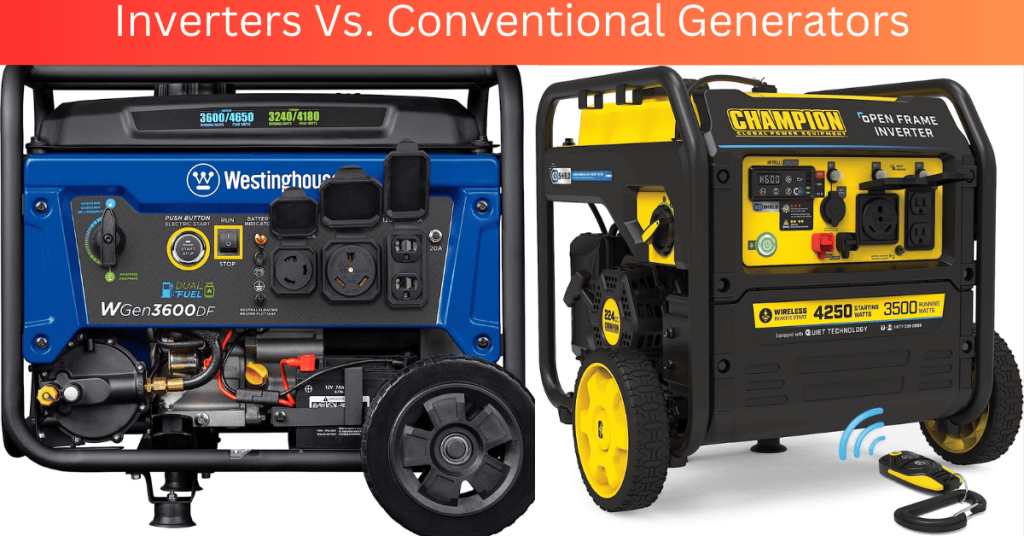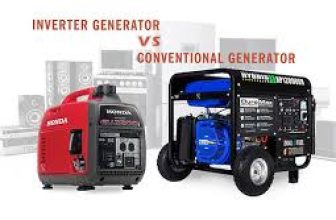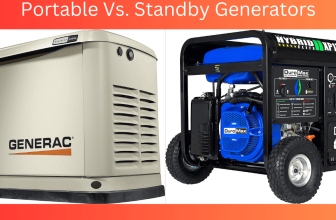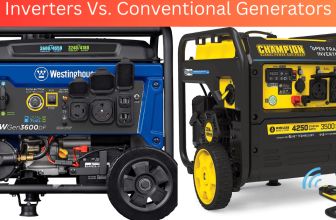Hey, everyone! I’m here to talk about the good and bad of inverter generators versus conventional generators. Have you ever been in a situation where you need power on the go? Whether it’s for camping, tailgating, or even a power outage at home, having access to an emergency source of power is invaluable.
Well, it’s time to understand the differences between inverter and conventional generators so you can make an informed decision about which one is right for you.
Inverter generators and conventional generators both have their advantages and disadvantages that you should consider before making your purchase. In this article, I’ll be discussing what makes each type unique and how they compare to each other in terms of cost, functionality, noise levels, and more.
So let’s get started!

Cost
The cost of an inverter generator versus a conventional generator depends on the model and power output you choose. Generally, an inverter generator will cost more than a conventional one.
I’m sure that has you thinking – why would I spend more money for something that does the same job? Well, there are some advantages to opting for an inverter generator.
For starters, they tend to be quieter and produce less exhaust fumes than their traditional counterparts. This makes them a much more attractive option if you’re looking for something to use when camping or in other quiet locations.
They also run at lower rpm speeds, so they last longer and require less maintenance than conventional generators.
Ultimately, whether you choose an inverter or traditional generator is up to your individual needs and budget. When it comes to cost, you should consider not only the initial purchase price but also how much money you’ll save over time with reduced maintenance costs and fuel efficiency.
Portability is another factor that might influence your decision…
Portability
When it comes to cost, conventional generators tend to be more affordable than inverter generators. However, when it comes to portability, it’s a very different story. Inverter generators are much lighter and more compact than conventional generators, making them perfect for camping trips, tailgating parties or any other situation where you need to take your power source with you.
Inverter generators also have an edge in terms of noise levels. While conventional generators can be quite loud, inverter generators are much quieter, so you won’t have to worry about disturbing your neighbors or anyone else who might be around. Plus, many inverter models come with low-noise technology that further reduces noise levels even more.
In addition to being lighter and quieter than their conventional counterparts, inverter generators also offer superior fuel efficiency. This is because they only use the power they need at any given moment and don’t waste energy like some conventional models can do. This makes them great if you’re looking for a power source that won’t run out of fuel too quickly.
Overall, when it comes to portability and convenience, there’s no denying that inverter generators come out on top. With their lightweight design and superior fuel efficiency they make an ideal choice for those who want a portable power source that won’t break the bank or disturb the peace.
Now let’s take a look at how these two types of generator compare in terms of functionality.
Functionality
I’m sure we’ve all been in a situation where we’ve had to choose between conventional and inverter generators. Both have pros and cons that need to be weighed before making a decision. In the table below, I’ll take a closer look at the functionality of each type of generator.
| Inverter Generators | Conventional Generators |
|---|---|
| Lightweight | Powerful |
| Portable | Easy to maintain |
| Quiet | Affordable |
Inverter generators are often much lighter than conventional generators, making them perfect for camping or other outdoor activities where portability is important. They also produce very little noise, so you don’t have to worry about it disrupting your peace and quiet. On the other hand, conventional generators tend to be more powerful, making them ideal for powering larger appliances or machines. They are also relatively easy to maintain since they don’t require as much attention as inverter generators do. And while they may not be as quiet as their inverter counterparts, they are usually more affordable.
It’s clear that both types of generators have advantages and drawbacks when it comes to functionality. Ultimately, the best generator for you will depend on your specific needs and budget. With this in mind, let’s move on to explore noise levels associated with each type of generator.
Noise Levels
When it comes to noise levels, inverter generators have a clear advantage over traditional generators. I’m talking about a big difference here – up to 50 percent quieter in some cases!
Traditional generators tend to be noisy, especially when they’re revved up and working hard. Inverters on the other hand are much quieter and can often be used without disturbing your neighbors or your peace of mind. They also run more smoothly than traditional generators, making them even more pleasant to be around.
Inverter generators typically produce sound at lower decibel levels than conventional models, meaning that you won’t have to worry about being too loud or disrupting the environment around you. If you’re camping in an area that requires quiet hours, such as national parks, then an inverter generator is definitely the way to go. It’s also great for tailgating events and picnics where you don’t want to annoy anyone with loud engine noise.
So if you’re looking for a generator that won’t disturb your neighbors or disrupt nature around you, then an inverter generator is definitely worth considering. You’ll get all the power you need without having to deal with the loud noise of a conventional generator.
And now it’s time to move on and talk about fuel efficiency – something else where inverter generators really shine!
Fuel Efficiency
When it comes to fuel efficiency, I think both conventional and inverter generators have their pros and cons.
On the one hand, conventional generators can be more fuel-efficient when running at full load, but they are not as efficient when running at partial loads.
On the other hand, inverter generators are known for their fuel efficiency when running at partial load, but they may not be as efficient when running at full load. So depending on what kind of performance you’re looking for in terms of fuel efficiency, you’ll need to consider both types of generators.
In terms of overall energy usage, inverter generators tend to be much more efficient than conventional models because they produce clean power that is free from spikes and dips in voltage, allowing them to run more efficiently over longer periods of time. This makes them especially useful for powering high-tech electronics that require consistent power levels. However, this increased efficiency does come with a price tag—inverter generators tend to cost more upfront than their conventional counterparts.
My conclusion is that if you’re looking for a reliable generator that offers good fuel efficiency without breaking the bank, then a conventional generator may be the best choice for you. But if you need consistent power levels or plan on using your generator for long periods of time, then an inverter generator is probably worth the extra cost.
Now let’s take a look at how these two types of generators compare in terms of durability and reliability.
Durability
As a homeowner, I am always on the lookout for ways to make my life easier and more efficient. When it comes to portable generators, two of the most popular types are conventional and inverter generators. Both have their advantages and disadvantages, so let’s take a look at their durability.
Conventional generators tend to be more robust and reliable than inverter ones. They usually have a much heavier internal construction, including thicker frames and stronger engine components. This makes them better able to withstand extreme weather conditions, such as heavy rain or windy conditions. Conventional models are also more likely to last longer with regular maintenance as they are built stronger than inverter models.
On the other hand, inverter generators are designed with smaller engines and lighter frames compared to conventional models. This means that they can be moved around more easily, but it also means that they can’t handle tough conditions as well as conventional units can. However, due to their smaller size, many people prefer them for camping trips or other outdoor activities because of their portability. Inverter generators also require less maintenance than conventional models because there are fewer moving parts inside them.
Overall, both types of portable generators offer different benefits depending on your needs. From durability to portability, each type has its own unique advantages that must be considered when making your decision.
Now let’s take a look at how these two types compare when it comes to environmental friendliness.
Environmental Friendliness
When it comes to durability, the inverter generator has some advantages over conventional generators. They are built with high-grade components and have a long life expectancy. They also have an efficient cooling system that helps protect the engine from heat damage.
However, when it comes to environmental friendliness, inverter generators are far superior to conventional generators. They produce cleaner power with significantly less carbon dioxide emissions and they operate at a much lower noise level than traditional generators. This makes them ideal for camping or RVing in areas where noise can be an issue. Additionally, inverter generators are more fuel-efficient than their conventional counterparts, making them better for both your wallet and the environment.
Maintenance requirements for both types of generators are similar in terms of regular oil changes, spark plug inspections and air filter replacements. However, inverter generators require less frequent maintenance overall since their engines run cooler and cleaner than conventional models. This makes them great for those who want to take care of their generator but don’t want to spend too much time on upkeep.
Maintenance Requirements
As you consider the good and bad of inverter generators versus conventional generators, it’s important to understand the maintenance requirements for each. In this section, I’m going to walk you through the steps needed to keep your generator running smoothly.
Let’s start by looking at the table below which compares inverter and conventional generators in terms of maintenance effort:
| Inverter Generator | Conventional Generator | |
|---|---|---|
| Scheduled Maintenance | Change oil every 50-100 hours; replace air filter every 200 hours; check spark plug every 100 hours. | Change oil every 25-50 hours; replace air filter every 100 hours; check spark plug every 50 hours. |
| Unscheduled Maintenance | Clean cooling fins as needed; check fuel system for clogs or leaks; monitor voltage output. | Check fuel system for clogs or leaks; monitor voltage output. |
From this table, we can see that an inverter generator requires more regular scheduled maintenance than a conventional generator. This is because the former has a quieter engine and runs efficiently on lower RPMs, so it needs more frequent checks on its components like spark plugs and air filters to keep it running optimally. On the other hand, a conventional generator runs at higher RPMs and produces more noise, so its components require less frequent inspections.
Although an inverter generator may require more upkeep than a conventional model, it can be well worth it if you need a quieter engine that runs efficiently on low RPMs in order to get your job done right. Now that we have discussed maintenance requirements, let’s move on to talking about which parts are available for each type of generator.
Availability Of Parts
Moving on from the discussion of maintenance requirements, availability of parts is also an important factor to consider when comparing inverter generators to conventional generators.
While it’s true that the inverter generator may require fewer regular servicing and maintenance components than a conventional generator, finding replacement parts for either type can be challenging. Parts for both types are often only available through the manufacturer or authorized service centers.
When it comes to finding genuine replacement parts for your inverter or conventional generator, there are plenty of aftermarket options available online. However, many of these aftermarket parts tend to be lower quality and don’t always last as long as genuine replacement parts sourced from the manufacturer or authorized service center.http://Westinghouse Outdoor Power Equipment 4500 Peak Watt Super Quiet Portable Inverter Generator, Remote Electric Start with Auto Choke, Wheel & Handle Kit, RV Ready, Gas Powered, Parallel Capable
It’s usually best to stick with genuine parts whenever possible in order to ensure that your generator runs optimally and safely. As such, it’s important to weigh up the pros and cons when deciding between an inverter generator and a conventional model since both have their own advantages and drawbacks when it comes to availability of parts.
With that in mind, let’s turn our attention now towards safety considerations when using either type of generator.
Safety Considerations
Safety is a primary concern when it comes to generators, and there are some important differences between inverter and conventional generators that should be taken into account. Inverter generators are much safer than conventional models as they produce cleaner power with fewer emissions, thus reducing the risk of an accident or injury. Table 1 outlines the key safety features of each type of generator:
| Inverter Generator | Conventional Generator | |
|---|---|---|
| Low noise levels | ✓ | X |
| Cleaner power output | ✓ | X |
| Reduced risk of fire/explosion | ✓ | X |
| Reduced emissions | ✓ | X |
When looking at these features, it’s easy to see why inverter generators are the safer choice. They run quietly, produce cleaner power and reduce the risk of fires and explosions due to their lower emissions levels. As such, they’re ideal for use in areas where there might be a lot of people around – such as campsites or public parks. On the other hand, conventional generators may be more suitable for industrial applications where noise levels aren’t as important.
Overall, safety should always be taken into consideration when choosing a generator and inverter models offer many advantages over conventional ones. Not only do they provide peace of mind due to their clean output and low-emission levels, but they also come with a range of additional benefits that make them well worth considering.
Frequently Asked Questions
How Long Will An Inverter Generator Run?
If you’re wondering how long an inverter generator can run, you’re in luck! These generators are designed for extended use, and depending on the size of the generator and the load you’re running, they can last up to eight hours on a single tank of fuel.
That’s much longer than conventional generators, which typically only run for two to four hours. So if you need a generator that runs longer without any refueling, an inverter generator is definitely worth considering.
What Is The Best Size Inverter Generator For My Needs?
If you’re looking for an inverter generator, understanding the best size for your needs is key.
If you’re going camping and don’t need to power much, then a smaller model of inverter generator will be enough.
But if you need more power, like to run a few household appliances or tools, then a larger size is what you’ll want.
Consider your specific needs and do some research on the different sizes available to find the best fit for you.
How Often Do I Need To Service An Inverter Generator?
Servicing an inverter generator is not as frequent as you might think. You should plan to do a basic service on your generator every year or two, depending on how much you use it, and how often it’s exposed to dust and debris.
This basic service includes changing the oil and air filters, checking the spark plug for wear, and cleaning the engine fan.
If you’re using your generator in extreme conditions (such as high heat or humidity), make sure to check the oil level more frequently – this will help extend its life.
Are Inverter Generators Suitable For Recreational Use?
Inverter generators are great for recreational use because of their quiet operation and portability. They’re also lightweight, easy to transport and generally more fuel-efficient than conventional generators.
But there are some things to consider before you buy an inverter generator, such as the size of your recreational needs and how often you plan to use it. Make sure the amount of power it can produce is enough for your needs, and that it has all the features you want such as USB charging ports or a remote start switch.
What Type Of Fuel Should I Use In An Inverter Generator?
When it comes to operating an inverter generator, the type of fuel you use matters. Generally, they run on gasoline and diesel, but some models can also be powered by propane or natural gas.
Gasoline is the most common type of fuel used in an inverter generator since it’s easy to find and affordable. However, diesel has a longer shelf-life than gas and can be stored for longer periods of time without deterioration.
If you want to go with a clean-burning option such as natural gas or propane, you should check with your manufacturer to make sure your model is compatible.
So, depending on your needs and budget, there are various fuel options available when using an inverter generator.
Conclusion
In conclusion, inverter generators have both advantages and disadvantages when compared to conventional generators. They are quieter, more fuel-efficient and can produce cleaner power, making them ideal for recreational use such as camping or tailgating.
On the other hand, they tend to be more expensive than conventional models and require more frequent servicing. Ultimately, it’s important to consider your own needs and budget when deciding whether an inverter generator is right for you.
I hope this article has helped you gain a better understanding of the good and bad of inverter generators versus conventional generators. Whether you decide to purchase an inverter model or stick with a conventional one, I’m sure you’ll find the perfect generator for your needs.





